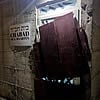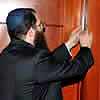Jewish communities along the west coast of Florida from Naples to Tampa Bay scrambled to make emergency preparations—and in many cases last-minute evacuations—Sunday morning as Irma smashed into the Florida Keys after re-strengthening to a Category 4 hurricane. It had been veering northwestward, unexpectedly taking direct aim at western half of the Florida peninsula after leaving behind a wake of death and devastation in the Caribbean.
When National Hurricane Service forecasts were revised and government officials began to issue new evacuation orders, Chabad-Lubavitch emissaries in southwest Florida took to the phones and social media before and after the Jewish Sabbath—even as they themselves were evacuating—to provide information and offers of assistance to their respective communities.
Some emissaries posted about the availability of supplies, such as plywood, sandbags and generators in local stores, while others urged everyone to come together in a “virtual heartfelt prayer.” Another post asked for help evacuating an elderly woman with dementia who was in the storm’s path.
Virtually all forecasts had predicted the direct track of the storm to follow Florida’s east coast, from Miami northward, and residents there, short on food and fuel, had been fleeing since the middle of last week. But because the storm is wider than the Florida peninsula, residents in all parts of the state were paying attention.
“The storm is so big that everyone was told to prepare in the beginning of the week,” says Chanie Bukiet, co-director of Chabad of Bradenton & Lakewood Ranch, Fla., with her husband, Rabbi Mendy Bukiet. While some in their community, located between Sarasota to the south and Tampa to the north, have left, others not in mandatory evacuation zones have decided to stay put. “Some did not want to ride it out and went to family or friends in Atlanta, North Carolina and elsewhere,” she says. “We are in touch with most of them just to know where they are, so that we can check up on them afterwards, encouraging them and giving support.
“We were going to be impacted regardless; we were always in the [hurricane prediction] cone,” continues Bukiet. “We, as well as other emissaries, did some more prep after Shabbat as well. Some were shuttering up after Shabbat.”
Though not in a mandatory evacuation zone, she reports, “our home is shuttered up, thank G‑d, and the Torahs are in safe place.”
While they opened their Chabad House for Shabbat-morning services, they did not get a minyan, a quorum of 10 Jewish men required for public prayer.

Retrieving Torah Scrolls
Rabbi Mendy Dubrowski, co-director of Chabad Chai in South Tampa with his wife, Nechama Dina, posted a video to Facebook around midnight on Saturday, urging people to take precautions and to be in contact if they needed help.
“We’ve made the decision to take the Torah scrolls out of Chabad House and make sure no damage happens to them, regardless of what may come to pass,” he said as he walked through his synagogue. “We know that, G‑d willing, we’ll be back and celebrate many wonderful things in the Chabad House. But for the sake of caution, we must do everything to protect that which is most dear to us, and so we are going to take our Torah scrolls.
“And if you have yet to protect what is most precious to you—your family first and everything else—then please take this as an opportunity to do so. We know that we are people of faith, and we continue to pray that G‑d will take the hurricane further into the gulf, but that should not preclude us from taking every precaution absolutely necessary to protect what is most dear to us—and that starts with our families,” Dubrowski said as he removed the Torah from the ark. “So please, please, take this as a sign that you need to do everything in your power to protect your families, as I am doing with my family and protecting our Torahs, which is the next thing that is most dear to us. ... If there is anything we can do throughout the storm, don’t hesitate to contact us.”
Hunkering Down in Makeshift Shelters
Rabbi Pinny and Chava Backman, co-directors of Chabad at the University of South Florida in Tampa, welcomed students for Shabbat dinner after hours of rushing around trying to get everything ready in advance of Hurricane Irma hitting their region.
Before Shabbat, Rabbi Backman arranged to use a concrete warehouse as a safe space where he and his family, along with students who needed a place to stay, could go. Then, he says, he began boarding up their house, “but when the evacuations were ordered, we rushed out to buy lots of water and inflatable mattresses—all kinds of supplies.”
But all that planning meant that they didn’t have time to secure the family’s home, which also serves as their Chabad House. “I do have concerns about it, as I did not have enough time to board up everything,” says Backman, adding that “time with tell.”
In the meantime, the Backmans, along with a few others, are hunkered down in their makeshift shelter and the younger children are keeping busy.
“They know what’s going on, and that it’s a hurricane. They know we are in safe place, and they have toys and coloring books and tablets, and they will ride it out,” says the rabbi.
But kids will be kids, he adds, and “they are very happy to be here because they’ve been looking forward to spending a couple of days camping out with the students.”
Though Irma was tracking further west than initially forecasted, Floridians in the eastern part of the state are feeling the effects, including punishing rain and heavy winds, causing trees and street signs to buckle and fall. The threat of tornadoes remains ever present.
And as of Sunday afternoon, power was out for more than a million Floridians in Dade and Broward counties, and more than 500,000 in the greater Miami area.
This story will be updated as new information is received.








Join the Discussion